It was a politically chaotic time in Israel. Prime Minister Yitzchak Rabin, a member of the Labor Party, resigned, bringing on new general elections. The elections brought dramatic change to the small country. On May 17, 1977, the right-wing Likud Party came to power, ending a twenty-nine year period in which the Left had governed Israel.
The Egyptians, the Saudis and the Americans panicked and began trying to figure out what the next move of the new premier, Menachem Begin, would be. Begin called for the Arab nations to come and sit down at the table to negotiate a peaceful resolution to the Middle East conflict. What the Premier resisted, however, was the notion of giving up land for peace. According to Time magazine's report from July 4th of that year, "To do so, [Begin] said, would put 'every city and home in Israel' within range of Arab guns."
The report continued: "In Jerusalem these days, it is considered good form to refer to the West Bank as 'Judea and Samaria' or as 'liberated land,' rather than 'occupied territory.'"
In the beginning of July, American President Jimmy Carter sent Israel a message: "Negotiations must start without any preconditions. This means no territories, including the West Bank, are automatically excluded from the items to be negotiated."
In a July 11th article titled "A Warning Shot Across Begin's Bow," Time concluded: "After all the squabbling, the fact remains that the Carter Administration has made clear its impatience with Jerusalem as well as its conviction that, in return for peace, Israel must withdraw from virtually all conquered territories and accept some kind of home for the Palestinians."
Stopover to Receive Advice and Blessings
The heat was on the Premier as he prepared for a visit to Washington to confer with President Carter. But before making his way to Washington, Begin made a stop at Lubavitch World Headquarters. In the words of Yehuda Avner, one of his aides, Begin "had a long-standing, close relationship with the Rebbe. Thus he came to pay his respects and receive his [the Rebbe's] blessings before continuing his journey to Washington."
On July 17, 1977, the Prime Minister arrived for a private audience with the Rebbe, Rabbi Menachem M. Schneerson, of righteous memory.
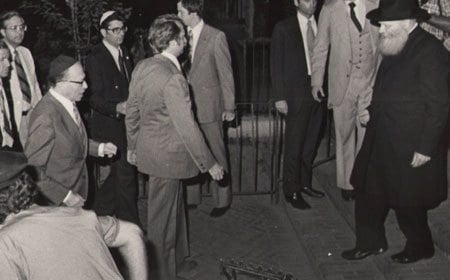
The Rebbe emerged from Lubavitch World Headquarters into the hundred-degree weather, as thousands greeted the Prime Minister from behind police barricades. The Rebbe and Begin warmly shook hands and, hand in hand, strode toward the entrance. The Rebbe made way for the Premier to enter first, but he refused. The same happened at the two other doorways through which they passed. Finally, both men entered the Rebbe's office.

Begin sat down, and evoking a saying of our sages, told the Rebbe that photographers are one of the things "that there is no measure for."
"Whether the press is good or bad, this is what democracy is all about," the Rebbe replied.

The Rebbe and the Prime Minister then held a brief press conference for the international press and media that were present. Premier Begin spoke first in Hebrew, and then the Rebbe spoke in Yiddish. Afterward, at the request of American reporters, they translated parts of their remarks into English. Prime Minister Begin began:
I have come tonight to our great master and teacher, the Rabbi, to ask from him his blessings before I go to Washington to meet President Carter for the important talks we are going to hold on the future of the Middle East.
The people in Israel pray for the success of these very important meetings. I do not call them 'fateful' meetings, because the people of Israel, the Jewish People, are an eternal people, and their lot and future are not dependent on a political meeting with the leader of the free world.

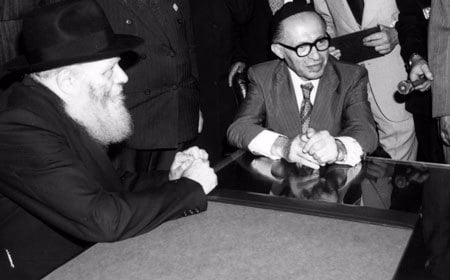
However, such a meeting has great importance for our future, and therefore I have asked for the blessings of the Rabbi, of our great teacher.
Rabbi Schneerson is a great man in Israel. All of us respect him; all of us accept his judgment. He is a great lover of the House of Israel. He has shown his deep sentiment and love for our children. His blessings are very important to me. I hope they will strengthen me and this very important mission I am going to fulfill during the meetings with President Carter, the president of the United States.
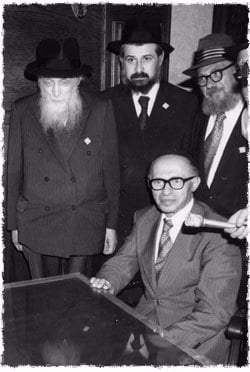 Prime Minister Begin explains why it was so important for him to meet the Rebbe prior to traveling to President Carter. (Photo: Velvel Schildkraut (Michele) Studios/Kahn family)
Prime Minister Begin explains why it was so important for him to meet the Rebbe prior to traveling to President Carter. (Photo: Velvel Schildkraut (Michele) Studios/Kahn family)And let us all hope that out of these meetings there will come an advancement towards security and peace, real peace, between Israel and the Arab countries, the peace for which we yearn and pray and which eventually will reign in the Middle East.
The Rebbe then followed:
My main pronouncement was in the language of the Jews of Russia [i.e. Yiddish] from where I come, but I only add a few words to recapitulate my blessings for the great success of this very important mission of the Premier Minister and also to underline a second time that I accept this honor of his visit certainly not on my personal account, but on the account of the movement of Lubavitch, which was dedicated for centuries to permeating Jewish people everywhere with the full faith in G‑d Almighty, and in the faith that they'll have their wishes for good fulfilled, in holding on to our tradition of Torah and mitzvot to go from strength to strength in spreading kindness and goodness around us. And that will also be a good vessel to accept the blessings of G‑d Almighty in all their needs, in the Diaspora and in the Holy Land, and to have real peace as a preparation for the coming of Messiah speedily in our times.
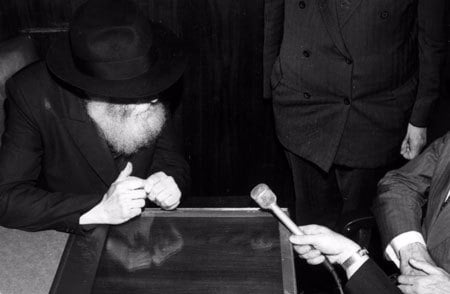 The Rebbe responds to the reporters, explaining that he gives his blessings to the Prime Minister as he travels to Washington. (Photo: Velvel Schildkraut (Michele) Studios/Kahn family)
The Rebbe responds to the reporters, explaining that he gives his blessings to the Prime Minister as he travels to Washington. (Photo: Velvel Schildkraut (Michele) Studios/Kahn family)And, of course, a special thanks to the Premier, Prime Minister, and also through him to the Jews in Eretz Yisroel, in our Holy Land, in general.
A reporter asked if the Rebbe would give his blessing to the Prime Minister on his trip to Washington. "Yes, more than a hundred percent," the Rebbe responded.
The Rebbe turned to one of the reporters and said, "Don't be offended by my accent." "It was very clear, no problem, no problem," the reporter answered.

The Rebbe responded, "The same thing is for the Holy Land, no problem."
When a reporter asked the Rebbe to clarify what he meant, the Rebbe explained: "There [should be] no problems for the Holy Land. Also, for the Prime Minister, make life easier for him." The reporter indicated that he did not understand what the Rebbe was referring to, and the Rebbe said, "You could do something about the media?"
"Anything that I could do, I will do."
"The media in the United States is very important," the Rebbe concluded.
"But you have more influence than we do!" said the reporter. To which the Rebbe responded, "Try your best, nevertheless."
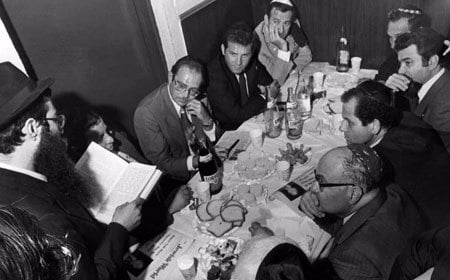
After issuing their statements, the Rebbe and Begin closeted themselves alone for a good hour.
In the meantime, the members of the Prime Minister's entourage got their own crash course on Chabad philosophy and Chassidic melodies.
What Was Discussed?
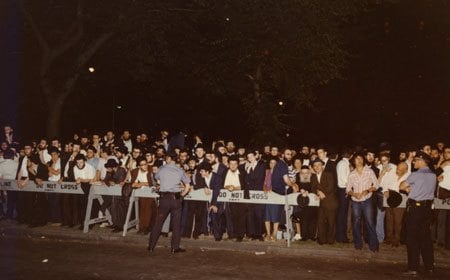
"[The meeting] lasted until after midnight in Brooklyn," Bill Seamans reported on ABC Nightly News, "a culmination of a long day of meetings with American Jewish leaders who gave Prime Minister Menachem Begin a last minute demonstration of support before his meeting with President Carter. Several thousand members of the Lubavitch movement of Chassidic Jews welcomed Begin when he arrived to meet their leader, Rabbi Menachem Schneerson, late last night. Begin was very moved by the reception."
While waiting for the Rebbe and the Prime Minister to emerge from their private meeting, the reporter was surprised to find that the Lubavitchers were using high-tech equipment, with "the Rabbi's blessings on Begin's meeting immediately broadcasted to Jews around the world by his group's own communications room."
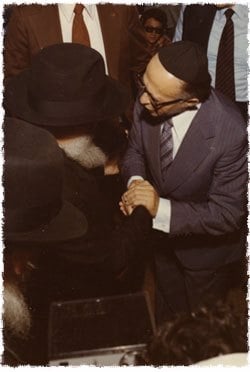
"The Grand Rabbi talks to the public on some occasions during the year," the reporter explained. He interviewed one of those involved in the broadcasts who said, "We're broadcasting it [the Rebbe's talk] throughout the world, to any country of the world that's not a communist country. You see we have Israel, London, Australia, Chicago, Los Angeles...We have 26 centers divided into 12 and from these the broadcasts spread out to other nations and other countries in their continents. This is the basic set up: From this telephone to 26 places in the world. From London it goes throughout Europe..."
At 12:40 a.m., the Rebbe and the Prime Minister emerged. Begin apologized to his aides for the length of time he had spent with the Rebbe, and the Rebbe said, "It is my fault."
The aides responded that it was no problem, "In the meantime we learnt some Torah."
Outside, the press asked the Premier to share the subject of his discussion with the Rebbe.

"Whatever I say to the Rabbi and he says to me is between us," he said. "[This is] an old custom between us for many, many years—it's not my first meeting with Rabbi Schneerson, we met many, many times, when I still served my people in the opposition—but more so when I am prime minister.
"Every conversation with the Rabbi is completely confidential. So you will not ask me on television or on radio to tell you what we talked about."
The Rebbe then escorted the Prime Minister to his limousine. On the way back to his own car, the Rebbe waved a thank you to all the police officers who had remained there so late.
Listen here to the entire press conference with the Rebbe and the Prime Minister. Watch here a short clip of the Prime Minister's statement.
Begin Arrives in Washington
In Washington, the Premier did not bend to the humiliating demands of the Carter Administration; he stood firmly with Jewish pride.

On July 19th, he told all those gathered for dinner that the food on his plate was kosher. He then donned a skullcap and loudly recited the traditional blessing thanking G‑d for creating the food. "Sometimes, as I heard today as well," Begin said, "journalists have an undertone when they ask me about the Bible. I am not ashamed to say that I do believe with all my heart in divine providence. Were it not for divine providence, where would we be today or tonight? We were sentenced to death, all of us, and the life of every one of us is a present. We could have been there in the trains and in the camps, as the wife of my friend and secretary, a young lady, was, having spent three years in Auschwitz, having looked every day upon that smoke coming from the chimneys and knowing what happened."
His stance did not elicit any animosity. In fact, the Premier was praised for his courage and principles. The President told those assembled at the dinner, "We've had a chance to get to know each other personally, and it's been obvious to me that our guest is a strong leader. He's a man of deep convictions and unshakeable principle. He's a man of truth and quiet dignity. He's a man who is polite and very modest."
Begin unhesitatingly expressed his strong belief that the government of Israel could not stop Jews from settling all parts of the Land. "Why is it permitted for a Jew to settle and live in Bethel or Shiloh in the United States, towns named after places in Judea and Samaria, but forbidden [for him] to build his home in the original Shiloh or Beth El?" he reportedly asked the President during their meetings. "I shall not lend my hand to discrimination against Jews in the Land of Israel."
At the dinner he explained, "Were it a territorial conflict, there would be no reason not to make peace with Israel. It is an historical conflict. We came there. We have come there by right to the land of our ancestors. But it was not recognized, and time and again attempts were made to destroy us.

"Sometimes you have a defeated aggressor claiming that he's the wronged victim. But we know what happened. We only defended ourselves against attempts, repeated, to destroy our people, our dream and our independence and, ultimately, our lives."
So impressed was he with the Prime Minister's stance that the President stepped back from his past statements and those of his administration. "We have also explored today some very sensitive questions, some that can prove to be embarrassing because of past statements made in the heat of anger or the heat of challenge or the heat of despair or the heat or depths of insecurity," he said. "And with a new hope being generated, we see a need for a frank discussion of all the issues that in the past have appeared to be insuperable obstacles toward peace."
The Prime Minister told the President that he did not come alone to the White House – the holy prayers and blessings of the sages and Jewish people across the globe accompanied him. "May I inform you, sir, that our spiritual leadership, the rabbinate, the day before yesterday asked the people to pray every day for the success of my mission. And they decided that there is a special song to say every day, a people praying for the success of one's mission."
The President concluded, "We both feel that this year is a propitious time to move toward real, permanent peace in the Middle East, a recognition by all nations that Israel has a right to exist, to exist as a proud and independent nation, to exist permanently, and to exist in peace. This is a basis on which we approach the coming crucial months."
Time summed up the meeting in the August 1st issue: "Begin impressed White House and State Department aides as witty, bright, shrewd—and tough as nails."
In fact, according to Time, "Washington agreed to provide $106 million for the production of a new Israeli tank called the Merkava (chariot) and to supply Israel with 18 attack helicopters and an undetermined number of F-16 fighters."
The Proud Prime Minister
In a letter dated August 1, 1977, the Rebbe touches upon the way the Premier conducted himself in Washington:
Speaking of the importance of Jewish communities in the Diaspora, the emphasis is not merely on numbers as they appear in a national census, but also and primarily on the quality of the Jewish population and leadership, namely, the extent to which Jews identify themselves with Jewishness and Jewish causes.
Here again, as I pointed out in our discussion, it is not enough just to write a check—however indispensable financial assistance is, but it must be an even more meaningful identification and personal commitment, touching deeply every Jew and reflecting in his daily life as a Jew. Such identification is not limited to the home and synagogue or when one is in the society of fellow Jews, but it must be evident everywhere, even among non-Jews, and even in the White House, with truly Jewish self-respect and avowed trust in G‑d, the Guardian of Israel, and with pride in our Jewish heritage and traditions—as was so eminently expressed in word and deed by Prime Minister Begin. It is the general consensus that this worthy deportment of the Jewish representative during his first encounter with the President of the USA had an immensely favorable impact and has established a personal rapport between the two leaders which will hopefully have far-reaching beneficial results also in terms of American support.
I trust you have followed closely the highlights and details of this visit and compared it with those of his predecessors. Here, for the first time, came a Jewish Prime Minister who declared in a loud and clear voice that he comes strengthened by the prayers of his fellow Jews at home and abroad and trusts in G‑d and the eternity of his people that his mission will be successful. And, as you surely know, when he sat down to break bread with President Carter, he made sure that it would be a Kosher meal, and he put on a Yarmulka [skullcap] and made a Berocho [blessing] and explained to the President the meaning of it. All of which has earned him the respect and admiration of the President and of all others who came in contact with him. Even from a pragmatic statesmanlike viewpoint this approach is bound to be a sure winner, though, regretfully, it had not been recognized by his predecessors.
The Aide Returns to Report from DC
Mr Avner relates:
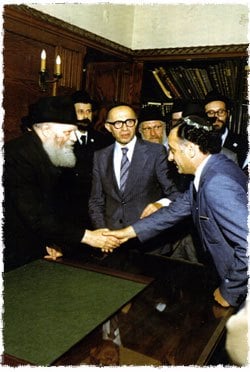
At the end of the audience, it was decided I would return to New York after the White House talks to brief the Rebbe on how they had fared.
When I called on the Rebbe, as arranged, we sat alone in his wood-paneled chamber whose furnishings were so timeworn they were monastic. We spoke in Hebrew—the Rebbe's classic, mine modern. And as he dissected my Washington report, his air of authority seemed to deepen. It came of something beyond knowledge. It was in his state of being, something he possessed in his soul which I cannot possibly begin to explain.
My presentation and his interrogation took close to four hours.1
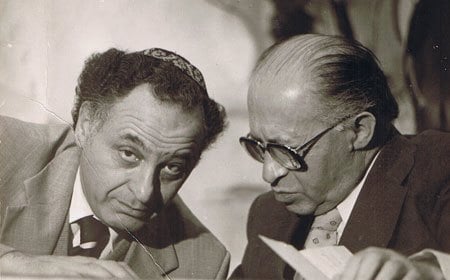
Regards from New York
Veteran Israeli journalist Michael Sheshar recounted a Chassidic gathering in Kfar Chabad that the Prime Minister attended several months after his return from Washington:
The electrified anticipation rises when the master of ceremonies announces that the guest of the evening is someone who just returned from a visit with the Rebbe, and "he will reveal snippets of what the Rebbe said to him."
And then Prime Minister Menachem Begin speaks. "I was in the Rebbe's presence from a quarter to ten to a quarter to one after midnight. The Rebbe works the entire night and does not sleep. Hence, I asked him, 'Why?' And he responded, 'The thought process at night is more concentrated.'
"However, also during the day he sleeps little and thus he doubles his work production. In this way he follows the ways of our great sages and exposes great strength of will and strength. For this reason the Rebbe does not need to sleep like an ordinary person.
"What did he say?" the premier rhetorically asks, "This the Rebbe did not permit me to reveal… However, nevertheless, to leave you with nothing is not possible, therefore I will tell you my impressions from the meeting.
"This is not our first meeting about the plotting of our enemies and the in-house weakness; we spoke about the most important subjects of our homeland and the Diaspora. I left the meeting with a great impression of the familiarity and of the expert knowledge that the Rebbe exposed.
"'The enemy,' he said, 'wants that we should give them parts of the land of Israel so that they could attack us; however, our security is reliant on that we should secure our right to the land of Israel.' The Rebbe says to every individual, that we need to uphold our right to the land of our forefathers, so that it should be the possession of our children for many generations to come.
"We need to renew the belief of the Maccabees. This is the message of the distinguished person and great man," the Prime Minister says, adding some of his own thoughts: "I suggest that we all ascend on Chanukah, the holiday of freedom, to Jerusalem, to the Western Wall, with one heart and say a prayer for the continued right to the land of Israel. The prayers should be received and may all of us merit to better and great days of security and peace."
His words are received with measured applause, as if the crowd is asking for a continuation, however, his time is not free. He needs to leave and rush and the band accompanies as he leaves to the melody of, "They [the enemy] will engineer a scheme and it will be foiled, conspire a plot and it will not materialize, for G‑d is with us."
The crowd calls to him as he leaves, "Be strong and thank you," and there are even those that give him a hug.
Sources: Time Magazine, ABC footage from the visit (courtesy of the JEM archive), audio from the visit, talk of Mr. Avner at The Oxford University Chabad Society in February 2009, Michael Sheshar's unpublished notes later published in the Kfar Chabad Magazine, issue 546.





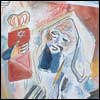

Join the Discussion